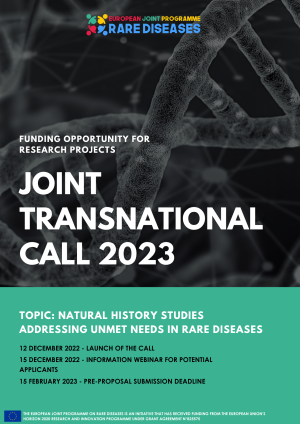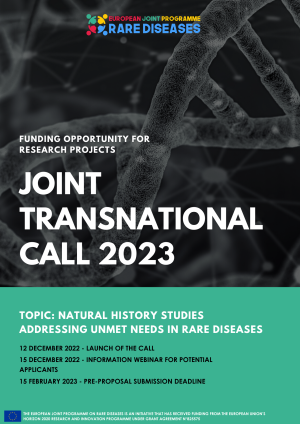European Joint Programme on Rare Diseases (EJP RD)
Call for Proposals 2023
“Natural History Studies addressing unmet needs in Rare Diseases”
General information
The European Joint Programme on Rare Diseases (EJP RD) has successfully implemented four Joint Transnational Calls since 2019 to further help in coordinating the research efforts of European, Associated and non-European countries in the field of rare diseases and implement the objectives of the International Rare Disease Research Consortium (IRDiRC). These actions are following the ten Joint Transnational Calls for rare diseases research projects launched previously by the ERA-Net E-Rare since 2006.
A number of national and regional funding organisations will participate in the EJP RD Joint Transnational Call (JTC) 2023 and will fund multilateral research projects on rare diseases. Final decision on participating funding agencies will be issued before the launch of the call. The call is expected to be opened simultaneously by the following funding organisations in their respective countries/regions:
- Fund for Scientific Research – FNRS (F.R.S.-FNRS), Belgium, French-speaking community
- Canadian Institutes of Health Research – Institute of Genetics (CIHR-IG), Canada
- French National Research Agency (ANR), France
- German Ministry of Education and Research (BMBF), Germany
- German Research Foundation (DFG), Germany
- National Research, Development and Innovation Office (NKFIH), Hungary
- Health Research Board (HRB), Ireland
- Chief Scientist Office of the Ministry of Health (CSO-MOH), Israel
- Italian Ministry of Health (IT-MoH), Italy
- Regional Foundation for Biomedical Research (FRRB), Lombardy (Italy)
- Tuscany Region (RT/TuscReg), Tuscany (Italy)
- Fondazione Telethon, Italy
- Research Council of Lithuania (LMT), Lithuania
- National Research Fund (FNR), Luxembourg
- National Centre for Research and Development (NCBR), Poland
- Slovak Academy of Sciences (SAS), Slovakia
- National Institute of Health Carlos III (ISCIII), Spain
- Swedish Research Council (SRC), Sweden
- Vinnova, Sweden
- Swiss National Science Foundation (SNSF), Switzerland
- The Scientific and Technological Research Council of Türkiye (TUBITAK), Türkiye
The aim of the call is to enable scientists in different countries to build an effective collaboration on a common interdisciplinary research project based on complementarities and sharing of expertise, with expected impact to use the results in the future for benefit of patients.
Topic: Natural History studies addressing unmet needs in Rare Diseases
The objective of this call is to conduct efficient, innovative and high-quality natural history studies which will facilitate understanding of the disease’s or group of disorders’ progression throughout the lifespan of a patient. The goal of these studies is to collect and analyze comprehensive patient data to define targets for future therapies, taking into consideration innovation, safety, and efficacy.
Research proposals should cover at least one of the following areas:
- Estimation of disease prevalence;
- Identification of biomarkers/companions for the diagnosis/prognosis of a RD;
- Identification of biomarkers/indicators/predictors of a rare disease or group of disorders (e.g. having the same aetiology) onset/progression (including collection of genetic, physiological, environmental data or variables….);
- Identification of relevant endpoints for future studies that include potential biomarkers, querying patient-reported outcomes (PROs) and quality-of-life measures;
- Identification of biomarkers/variables for therapeutic approaches (pharmacology, drug repurposing, gene therapy, RNA therapy, cell therapy, medical devices…).
It is possible to use cellular and animal models for validation of endpoints and biomarkers uncovered in the natural history studies where relevant.
Furthermore, additional elements need to be considered in the application:
- Strategies and timelines for patient recruitment, retention, assessment, and analysis must be included. Data supporting the proposed recruitment numbers is mandatory. The study design and objectives should take into consideration what information regarding the rare disease population would be needed in order to pursue clinical trials or other health care related studies in the specific rare disease/group of rare diseases studied. There always need to be clear research questions that are addressed in the study/registry. Clear plans for sustainability of the resources must be described. Consideration of common data elements as outlined in the recent publication “Set of Common Data Elements for RD Registration”;
- Integration of appropriate bioinformatics and statistical skills should constitute, whenever justified, an integral part of the proposal, and the relevant personnel should be clearly specified;
- Proposals are expected to consider how sex and/or gender might shape research activities. Applicants are encouraged to visit European Commission, Directorate-General for Research and Innovation, Horizon Europe, gender equality , and CIHR’s Sex, Gender and Health Research resource page for more information on key considerations for the appropriate integration of sex and gender in their proposal;
- Providing harmonized/standardized data, collected using innovative means (AI, simulations, modelling…) are highly encouraged. Modelling and simulation allow for organisation of diverse data sets for optimisation of the possible future therapeutic product based on individual physiology and genetics. Innovative methods for data collection as well as data dissemination which can serve as a model for future studies are highly encouraged;
- The new research data resulting from the project should be treated permissible according to the Findable, Accessible, Interoperable, Reusable FAIR principles (for more information: see The FAIR Guiding Principles for scientific data management and stewardship | Scientific Data (nature.com), and deposited and shared, according to the national/regional rules of the countries involved. It is strongly advised to make data accessible through RD-Connect or Elixir. To make research data FAIR, a data management strategy for the proposed full project is mandatory in the full proposal stage. Research including Indigenous people should also adhere to the CARE (Collective benefits, Authority to control, Responsibility, Ethics) Principles for Indigenous Date Governance. Some countries involved in EJP RD JTC 2023 will also ask for a data management plan (DMP) at national level at the stage of full proposal or after granting of the project;
- Insights into defining genotype/phenotype correlations, identifying appropriate subpopulations or stratification of patients for a trial are of importance to characterise newly discovered disease, a new subgroup of patients etc.;
- Inclusion of patient and caregiver perspectives from the RD community is strongly encouraged. Patients living with a RD or a family member who cares for them, have experiences and knowledge that can contribute to generating data about the natural progression of the disease. Patients should be involved in all steps of planning and implementation of the study;
- For the small group of well-characterized rare diseases with approved treatments or improved standard of care, prospective studies can help to better define the altered disease progression under the current medical setting. Thereby, studies collecting data regarding adverse events and providing reference/data for development of a more effective or safer treatment can be considered for complementing the natural history study.
The following approaches and topics are excluded from the scope of the call JTC2023:
- Interventional clinical trials to prove efficacy of drugs, treatments, surgical procedures, medical procedures. This also includes studies comparing efficacy, e.g. two surgical techniques or therapies. Projects whose main objective is the implementation of a clinical phase IV pharmacovigilance study cannot be funded either.
- Studies on the exclusive testing of the safety of medical devices and drugs.
- Development of new therapies as covered in EJP RD JTC 2020.
- Development of new analytic tools and pathways to accelerate diagnosis and facilitate diagnostic monitoring of rare diseases as covered in EJP RD JTC 2022.
- Projects focusing only on rare neurodegenerative diseases which are within the main focus of the Joint Programming Initiative on Neurodegenerative Disease Research (JPND). These are: Alzheimer’s disease and other dementias; Parkinson’s disease (PD) and PD-related disorders; Prion diseases; Motor Neuron Diseases; Huntington’s disease; Spinal Muscular Atrophy and dominant forms of Spinocerebellar Ataxia. Interested researchers should refer to the relevant JPND calls. However, childhood dementias/neurodegenerative diseases are not excluded.
- Rare infectious diseases, rare cancers and rare adverse drug events in treatments of common diseases. Rare diseases with a predisposition to cancer are not excluded.
Projects shall involve a group of rare diseases or a single rare disease following the European definition i.e. a disease affecting not more than five in 10.000 persons in the European Community, EC associated states and Canada. Applicants are encouraged to assemble groups of rare diseases based on solid criteria and commonalities if these leverages added value in sharing resources or expertise and has the capacity to elucidate common disease mechanisms and therapeutic targets.
Partners belonging to one of the following categories may request funding under a joint research proposal (according to country/regional regulations):
- academia (research teams working in universities, other higher education institutions or research institutes),
- clinical/public health sector (research teams working in hospitals/public health and/or other health care settings and health organizations),
- enterprises (all sizes of private companies) when allowed by national/regional regulations,
- patient advocacy organizations.
The maximum duration of the project is three years.
Only transnational projects will be funded. Each consortium submitting a proposal must involve four to six eligible principal investigator partners from at least four different participating countries. No more than two eligible partners from the same country can be present in each consortium (further national limits may apply). This limit applies to Early Career Researchers and partners from underrepresented countries (see below).
The number of partners can be increased to 8 in two cases:
- The inclusion of partners from participating countries usually underrepresented in projects (Slovakia, Hungary, Lithuania, Poland, Sweden and Türkiye).
- The inclusion of Early Career Researchers as full partners.
Each transnational proposal must nominate a project consortium coordinator among the project partner principal investigators. The coordinator must be an eligible project partner from an EJP RD JTC 2023 funding country/region. The project coordinator will represent the consortium externally, to the JCS and to CSC, and will be responsible for its internal scientific management (such as controlling, reporting, and intellectual property rights issues). This workload should be taken into account in the estimation of the budget of the coordinator. A single principal investigator will represent each project partner. Within a joint proposal, the principal investigator of each project partner will be the contact person for the relevant country/regional funding organization.
The aim of the call is in compliance with the vision and goals set by the International Rare Diseases Research Consortium (IRDiRC) which fosters international collaboration in rare diseases research. For more information, visit the IRDiRC website.
The use of JTC2023 matchmaking tool is strongly encouraged to build multidisciplinary research projects: https://connect.eventtia.com/en/public/events/jtc2023matchmaking/registration/attendees
There will be a two-stage submission procedure for joint applications: pre-proposals and full proposals.
An independent international Scientific Evaluation Committee will carry out a scientific evaluation according to specific evaluation criteria.
12th December 2022 | Launch of the call |
15th December 2022 | Information webinar for potential applicants* |
15th February 2023 | Pre-proposal submission deadline |
End of April 2023 | Invitation to full proposal |
14th June 2023 | Full proposal submission deadline |
26th July 2023 | Deadline for rebuttals |
December 2023 | Notification of funding decision |
*You will need to register to participate in the information webinar here: https://forms.office.com/r/CLYFTuzRyw
Further information and the official publication of the call will be available on the website of the EJP RD
For general questions regarding the joint call please contact the Joint Call Secretariat at the ANR, France:
E-Mail:
Dr. Florence Guillot; Dr. Ingrid Pfeifer; Dr. Camille de Almeida
EJPRDcall@anr.fr
For questions regarding national eligibility criteria and requirements please contact the national contact person listed below
The content and procedures of the call described in this pre-announcement may be subject to change and are not legally binding.



